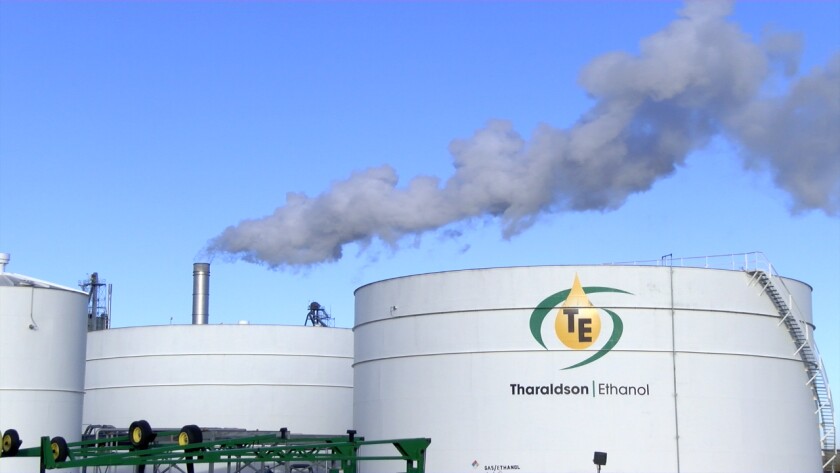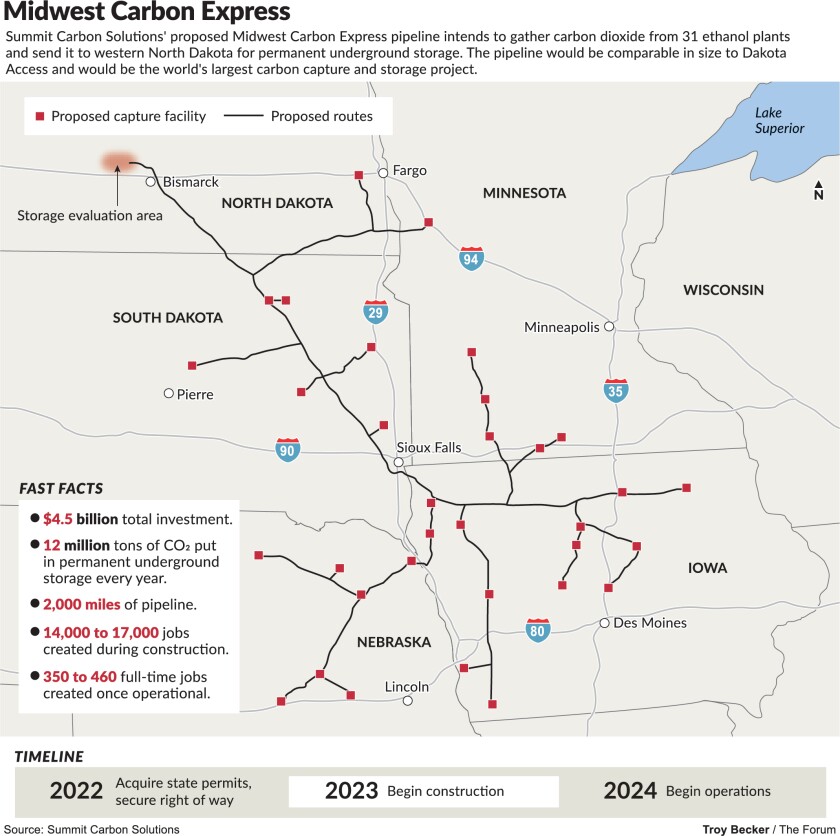Tim Trettin had only recently added some Iowa farmland when he learned about a carbon capture pipeline for his area of north-central Iowa.
One of his concerns for the 3 acres that could be impacted by the Summit Carbon Solutions pipeline is the drain tile. He said he knows it’s “out there somewhere,” he’s just not sure exactly where, and he hasn’t owned it long enough to know how the field is supposed to drain.
Drain tile is a common concern among farmers with cropland in the path of carbon pipelines.
The Summit pipeline would gather carbon from ethanol plants in five states and send it to western North Dakota where it can be stored underground.
Trettin attended a meeting in Mason City, Iowa, for landowners affected by the pipeline. Several landowners spoke up about drain tile.
“Drain tile repair will be an extensive effort,” Summit’s Alex Lange said during that meeting.
Summit is counting on Ellingson Companies to fulfill the promise of making the needed repairs to drain tile as part of pipeline construction.
“We’re there to work for the growers,” said Jeremy Ellingson, the chief operating officer for Ellingson. “We’re there to make sure that their drain tile is operating and performing just the way it was before the pipeline.”
As for landowners like Trettin, “We’re locating and finding tile all the time,” Ellingson said. “That’s something that’s second nature to us.”
He said the company uses several tools, from aerial imagery to probes, “right down to physical verification.”
He said the company will be collecting information before and during construction. He also said they will likely find old tile that are no longer functioning as intended.
“Our proprietary drain tile mapping and management systems we have here in house make that way more efficient than it used to be done in the old days,” Ellingson said.
has experience with pipeline projects, including having been called in to repair drain tile for part of the Dakota Access Pipeline project that started construction in 2016.
He said the company, which has been around for more than 50 years, has been involved with several cross country utilities projects.
He credits Summit Carbon Solutions, an offshoot of Iowa-based Summit Agricultural Group, with getting Ellingson involved early in the $4.5 billion pipeline project.
“I really think that Summit is doing a great job getting us involved early in this project which isn’t always the case in pipeline jobs,” Ellingson said.
Summit is hoping to start construction on the 2,000 mile Midwest Carbon Express pipeline in 2023 and be operational in 2024.
Ellingson said with the carbon pipeline using smaller diameter pipe on its feeder lines and the tile identification “it’s a totally different project” than Dakota Access.
“Their approach is a lot different,” Ellingson said of Summit. “I know that they’re committed to making sure that all things drain tile run through Ellingson.“
Ellingson said the more information that landowners can provide ahead of time about field drainage, the better.
“Pre-planning, getting the tile identified is what is so important,” Ellingson said.
Jeremy Ellingson works out of the Rochester, Minnesota, office and has a brother, Derrik Ellingson, vice president of the ag division, who works out of the Harwood, North Dakota, office, north of Fargo. Their father is president and CEO Roger Ellingson.
A branch of the Summit pipeline is planned to run near Fargo, connecting Tharaldson Ethanol at Casselton, North Dakota. A line also would run west from the Green Plains ethanol plant at Fergus Falls, Minnesota, across the Red River, where it will join up with a feeder line from Tharaldson. There could also be a branch running south from a planned fertilizer plant at Grand Forks, North Dakota, to join the line near Casselton.

Jaryn Homiston / Agweek
The hazardous material pipeline faces opposition from many landowners and county governments along the route.
Trettin, the Iowa farmer, said he is “not exactly for it,” referring to the pipeline. He said the compensation offer from Summit was “relatively fair” but he would not sign a voluntary easement agreement until the project were to be approved by the Iowa Utilities Board. Under current rules in Iowa, an approved permit would give Summit the right to use eminent domain to force landowners to provide access for the pipeline.
As for Ellingson Companies, “I felt better after talking with them,” Trettin said. “They have the experience.”
The pipeline would capture greenhouse gas emissions from the ethanol plants along the route, allowing those plants to sell fuel for a premium on the low-carbon market. Summit also would be able to cash in on federal tax credits for carbon storage.
“I think it’s a great project for the Midwest,” Jeremy Ellingson said.

